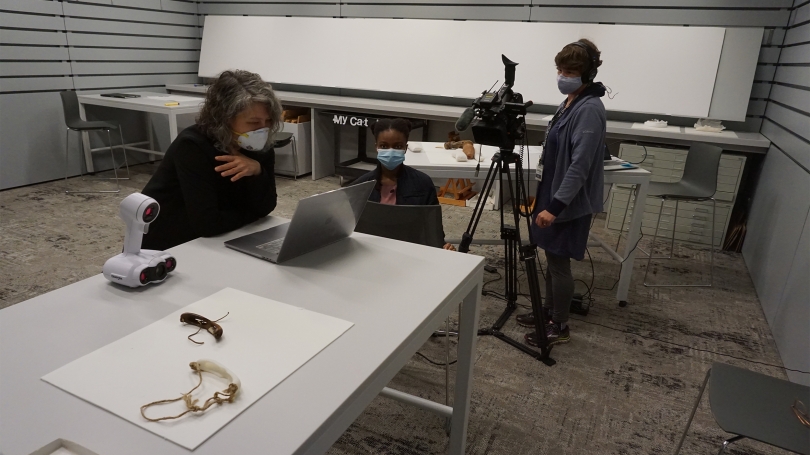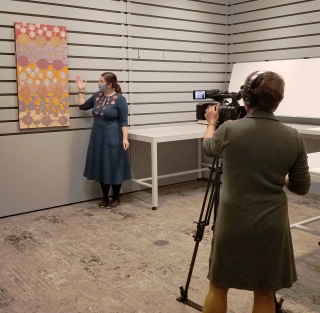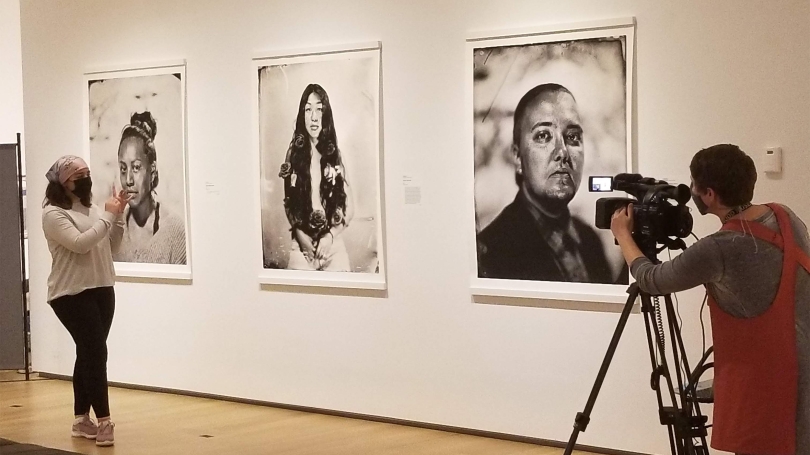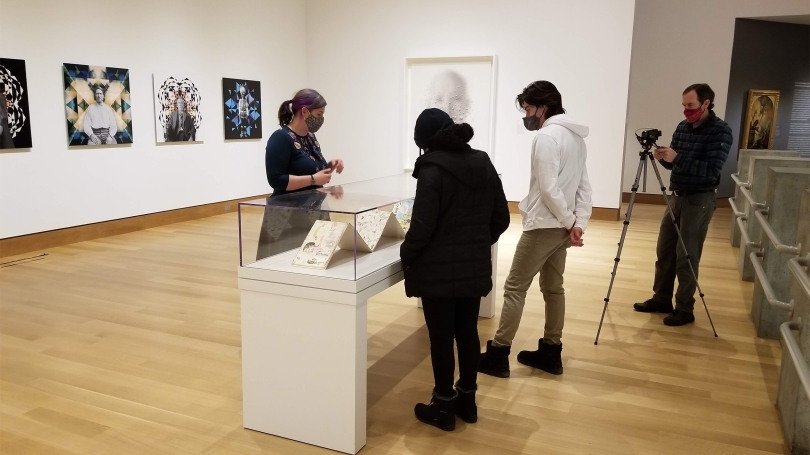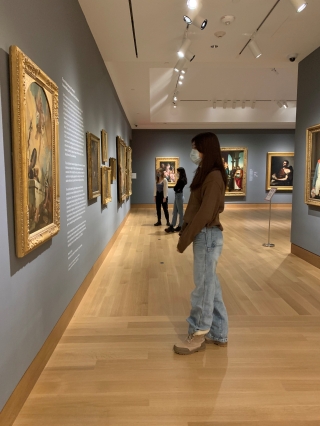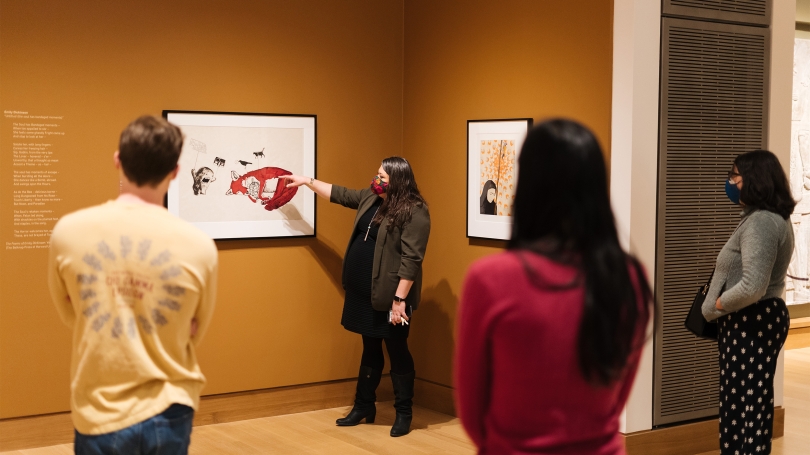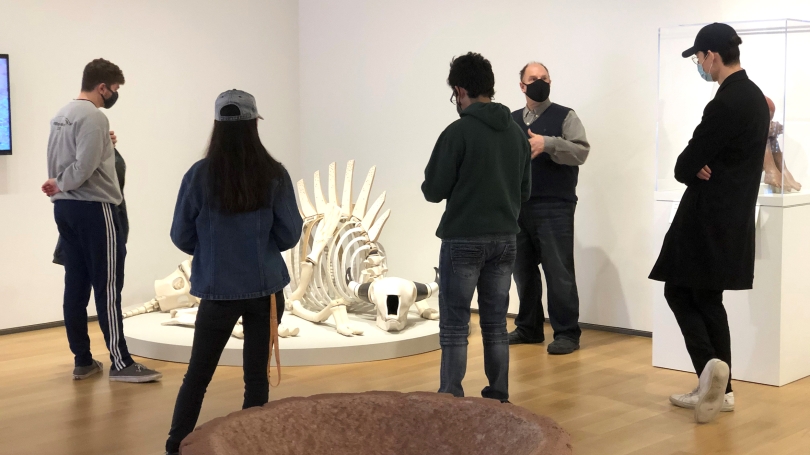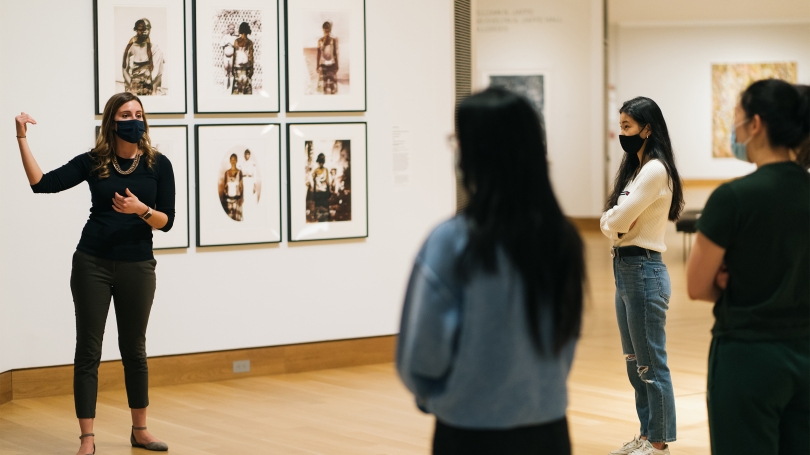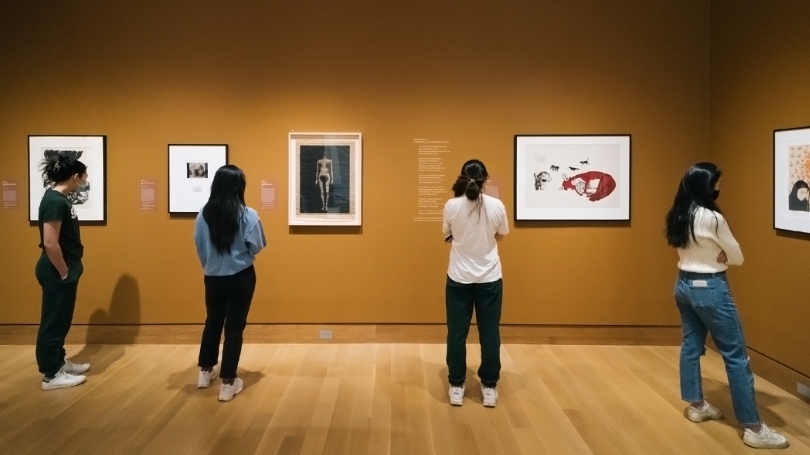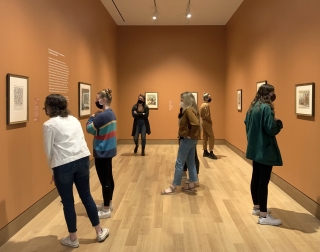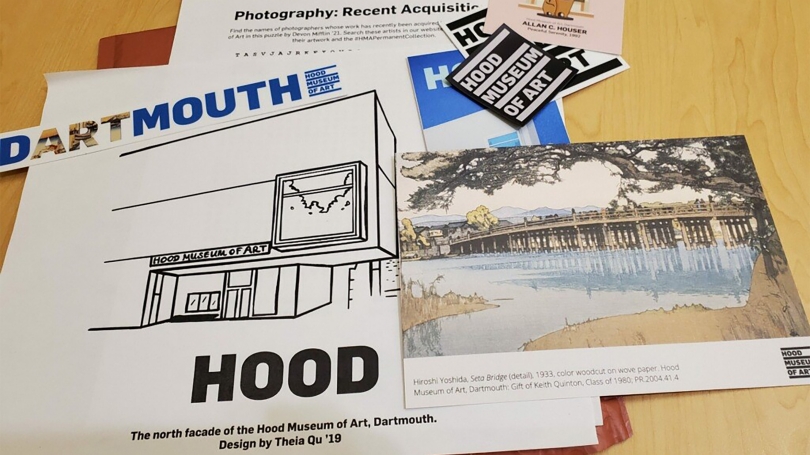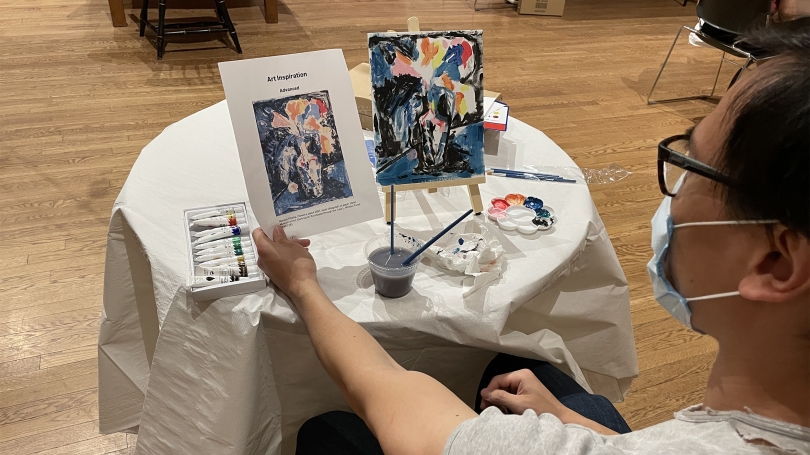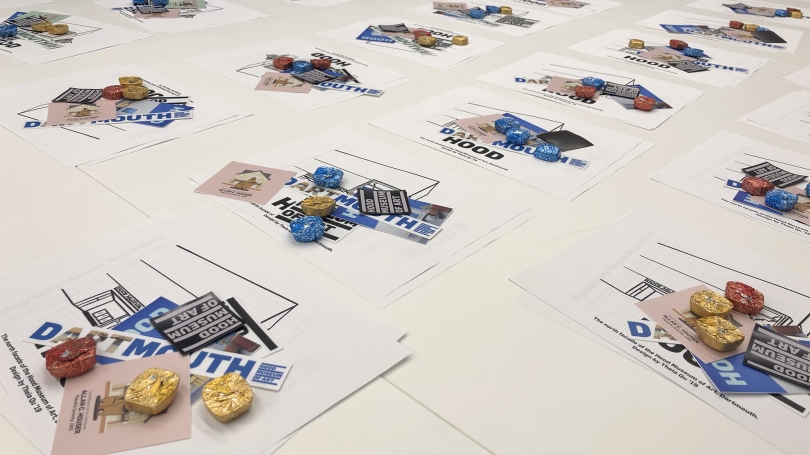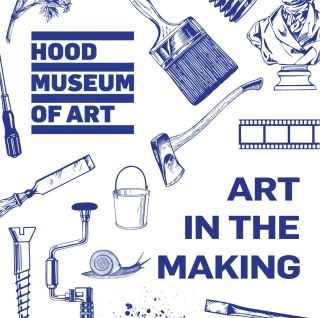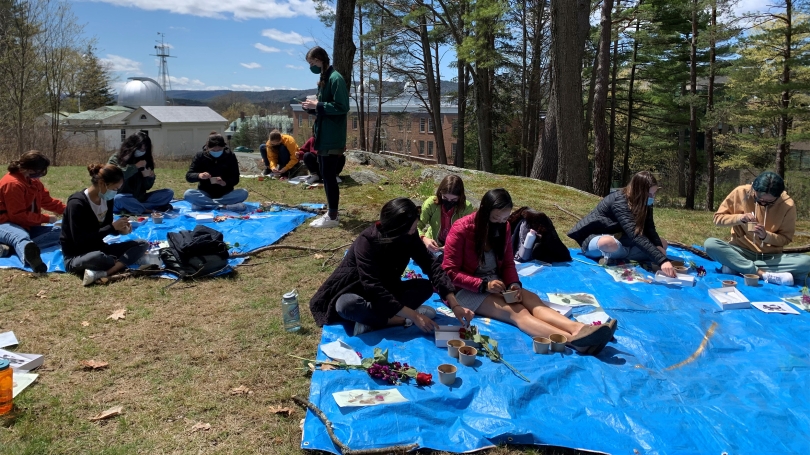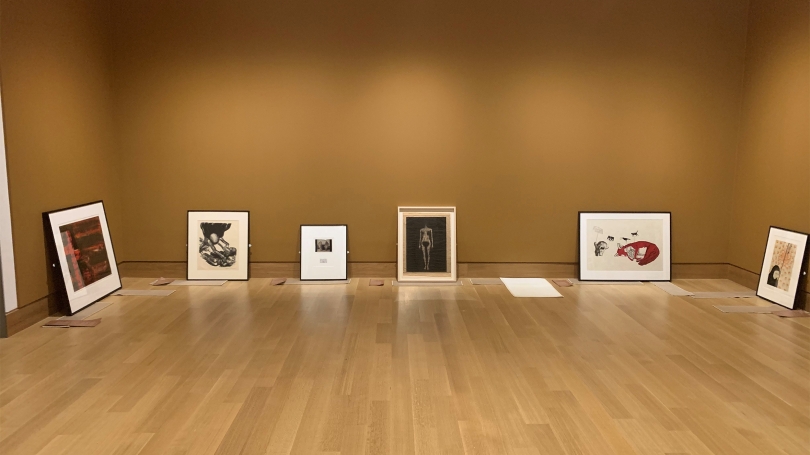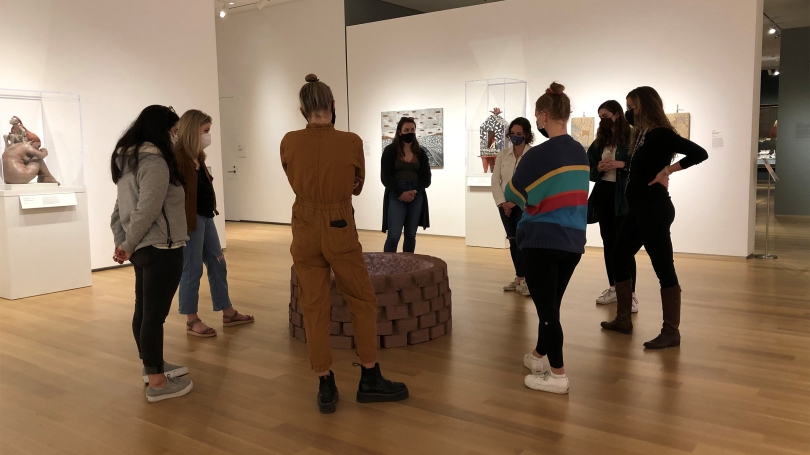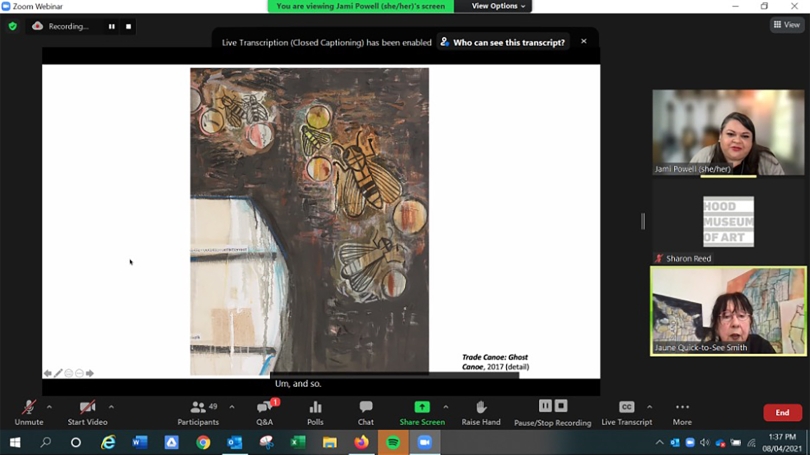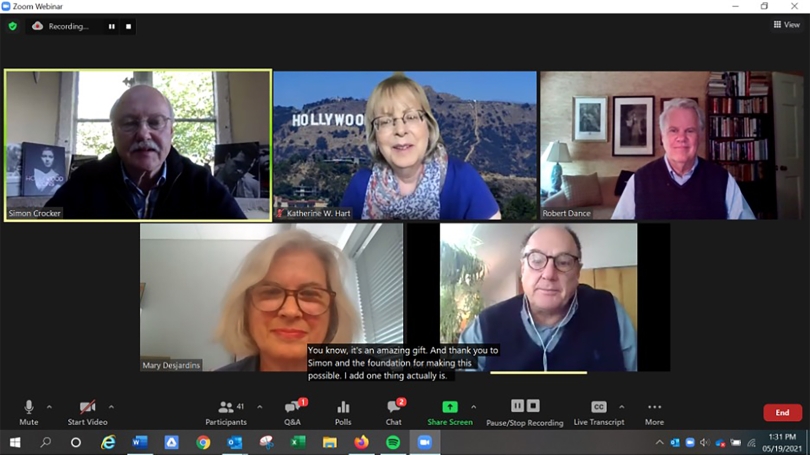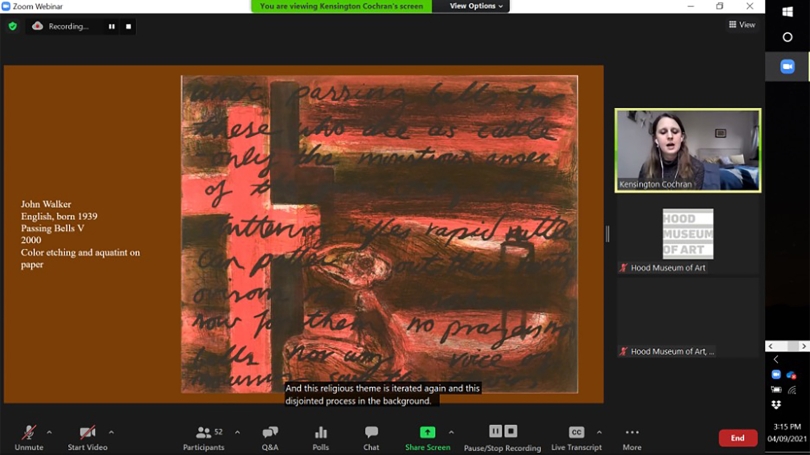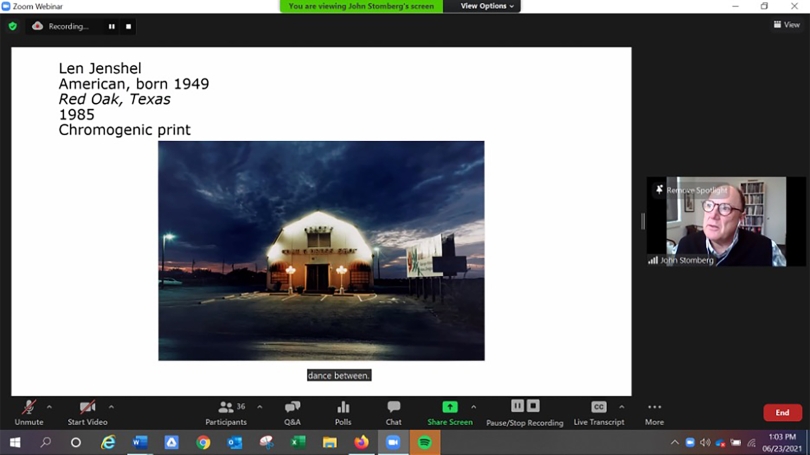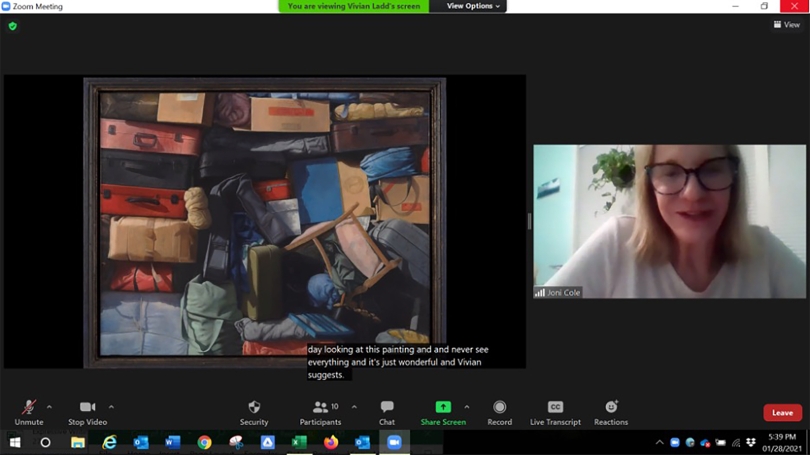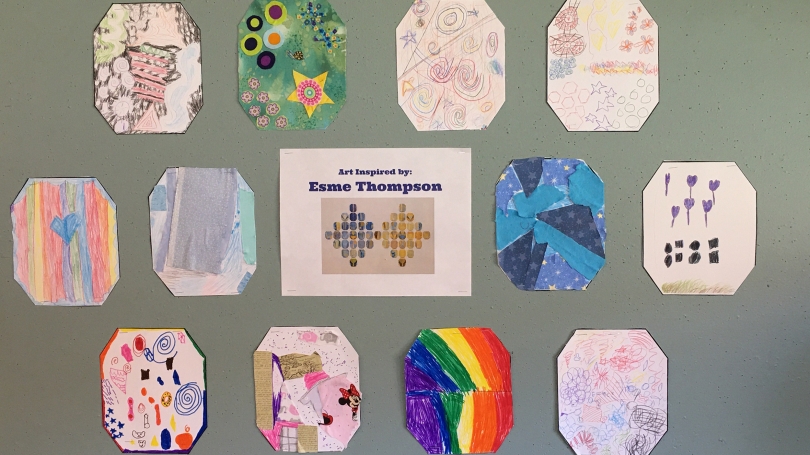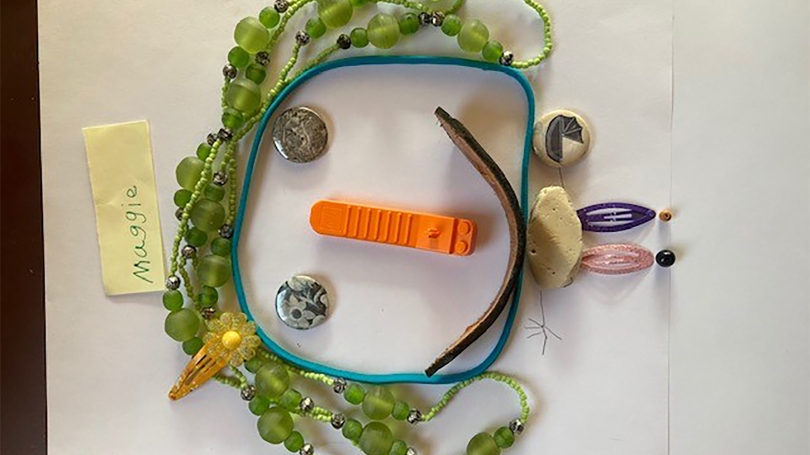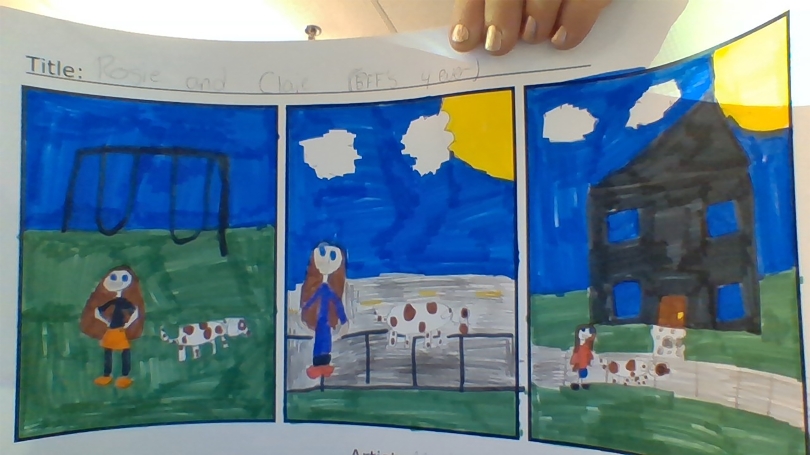Public, Campus, and Community Programs
July 8
Virtual Conversation | School Photos: Why They Matter in Times of Crisis
In this online conversation, Marianne Hirsch and Leo Spitzer, guest curators, and Amelia Kahl discussed their recent exhibition School Photos and Their Afterlives, highlighting the ubiquity of class photos across the globe and their importance in moments of crisis. Argentine artist Marcelo Brodsky, whose image The Class was featured in the exhibition, joined the conversation to describe his work with school photos in the pursuit of solidarity and social justice.
July 15
A Closer Look | Trade Canoe: Forty Days and Forty Nights
An exploration of Jaune Quick-to-See-Smith's painting Trade Canoe: Forty Days and Forty Nights with Jami Powell and Neely McNulty.
July 22
Virtual Gallery Talk | The Embodiment of Language
Morgan E. Freeman, DAMLI Native American Art Fellow, and Thomas Price, curatorial assistant, revisited an earlier program based on the exhibition of the same name. Cocurators Freeman and Price drew upon Martin Luther King Jr.'s legacy as an orator to reflect on works by Black artists and the specific relationships between Blackness and language.
July 23
Virtual Adult Workshop | Expressive Writing
This workshop fused explorations of works of art with fun and meaningful expressive writing exercises. Facilitated by Hood education staff and author Joni B. Cole, founder of the Writer's Center of White River Junction.
July 28
Virtual Dartmouth | Perspectives Group Tour
Perspectives: Dementia Engagement for Care Partners and Loved Ones through Art offers an intergenerational opportunity for individuals with dementia, their care partners and students to visit the world-class works that are currently featured at the Hood Museum. Looking at art is an activity that can be especially enjoyable and beneficial to those with Alzheimer's disease and other forms of dementia. Art viewing utilizes areas of the brain unaffected by the disease; it can stimulate thoughts, reactions, and emotions with minimal reliance on recent memory.
August 6
Customized Engagement | Cedar Hills Living Facility—Docent Led
August 14
Virtual Mindfulness in the Museum
Led by Dartmouth's Mindfulness Practice Group, we took some time with Francois Gignoux's painting New Hampshire (White Mountain Landscape).
August 19
Virtual Gallery Talk | The Curated Campus: Art and Environment
John R. Stomberg discussed how we think about placing public art so we have synchronicity between the ideas embodied in the art and the activities going on in different parts of campus.
August 25
Virtual Dartmouth Perspectives Tour—Docent Led
August 27
Customized Engagement | Valley Terrace Tour—Docent Led
September 16
Virtual Conversation | Innovation and Resilience: What We Learn from Artists
John R. Stomberg and Vivian Ladd introduced three artists whose innovative work began with a problem. Colleagues for over 30 years, Stomberg and Ladd shared some of the personal and professional benefits gained from thinking like an artist and the ways in which creativity, roadblocks, and improvisation were hallmarks of the newly expanded Hood Museum of Art's first year of installations in 2019.
September 21
Virtual Student Panel Discussion | How to Get Involved with the Museum
Three students—Analicia Gonzales '21, Devon Mifflin '21, and Halle Dantas '21—spoke about the various ways to get involved with the Hood Museum through events, clubs, programs, and more. Moderated by Isadora Italia and Amelia Kahl.
September 22
Virtual Dartmouth Perspectives Tour—Docent Led
September 24
Customized Engagement | Woodlands Living Facility Tour—Docent Led
October 2
Virtual Dr. Allen W. Root Contemporary Art Distinguished Lectureship
In recent years, museums have been publicly confronted with their colonial legacies and exclusionary practices. In this unprecedented era of COVID-19, in tandem with mass protests and upheavals initiated by the #BlackLivesMatter movement for racial equity, social justice, and systemic change, these conversations have come to the fore with even more prominence within and around institutional spaces. This year's Dr. Allen W. Root Contemporary Art Distinguished Lectureship focused on different curatorial models and how we can rethink institutional practices for long-term change.
October 21
Virtual Panel Discussion | Centering Indigenous Knowledges in a "Nebulous" Moment
The exhibition Form and Relation: Contemporary Native Ceramics at the Hood Museum raised important questions with which communities across the globe are grappling: How can we shift our understanding of the land from one of ownership and extraction to one of relationality? How do we move toward a recognition of our shared humanity? How do we create a world in which future generations can thrive? Using these framing questions and artist Courtney M. Leonard's site-specific installation BREACH: Logbook 20 | NEBULOUS as starting points, the panelists considered the complexities of our current moment and the myriad entanglements and impositions that impact our lives and futures. Grounded in Indigenous ways of knowing, each of the panelists provided a unique perspective on issues of the environment, relationality, resource management, intergenerational knowledge, and art making.
October 27
Virtual Dartmouth Perspectives Tour—Docent Led
October 28
Customized Engagement | Woodlands Living Facility Tour—Docent Led
October 28, 30
Virtual Storytime in the Galleries | Halloween!
Visitors in costume joined Museum Educator Jamie Rosenfeld for a virtual Halloween Storytime in the Galleries. Using Zoom, families listened to stories, looked at art together, and engaged in hands-on activities inspired by art from cultures around the world!
October 29
Virtual Art after Dark | Escape Room
November 2
Facilitated Experience | Escape to the Outdoors with the Dartmouth Office of Accessibility
November 5
Virtual Adult Workshop | Expressive Writing Workshop
November 6
Virtual Second Annual Indigenous Peoples' Month Fashion Show
November 10
Virtual Panel Discussion | Alumni in the Arts
November 12
Virtual Adult Workshop | Maker's Night: Working with Found Objects
Taking inspiration from collage and assemblage art in the Hood Museum's collection, participants made art together from what each had on hand at home.
November 24
Virtual Dartmouth Perspectives Group Tour
January 7, 8, 9
Virtual Storytime in the Galleries | Portraits!
January 13
Virtual Spotlight on Public Art at Dartmouth: Thel by Beverly Pepper
January 21
Virtual Conversations and Connections | Used to be Different, Now It's the Same?
It's become a commonplace to hear that 2020 has forever changed the art world, and cultural heritage in general. But this is a story we've heard before. During the dot-com boom of the early 2000s, museums like the Guggenheim, Whitney, and SFMoMA made a leap to digital collections and programming, though many later retreated to habitual practices that were less adventurous. What lessons can be learned from the digital gold rush of the turn of the millennium, and how should museums apportion resources strained under the pandemic to take advantage of this latest transition?
January 26
Virtual Dartmouth Perspectives Group Tour
January 28
Customized Engagement | Woodlands Living Facility Tour—Docent Led
January 28
Virtual Adult Workshop | Expressive Writing Workshop
February 10
Virtual Tour | Women's Club of Boston Tour
February 10
Virtual Space for Dialogue | When Art Intersects History
February 18
Virtual Art After Dark | Feast Your Eyes
February 23
Virtual Dartmouth Perspectives Group Tours
February 25
Customized Engagement | Woodlands Living Facility Tour—Docent Led
February 25
Virtual Conversation and Connections | Intergenerational Knowledge: Relationships to Place and Practice
Morgan E. Freeman, cocurator of Form and Relation: Contemporary Native Ceramics, in conversation with artists Roxanne Swentzell and Rose B. Simpson. In addition to discussing their collaborative work Timeline Necklace, the artists discussed their artistic practices, relationships to land, and practices of intergenerational knowledge transfer.
March 2
Virtual Alumni in the Arts | Creating and Curating
The Museum Club hosted an Alumni in the Arts panel discussion featuring Mateo Romero '89, Pueblo painter and Dubin Fellow, and Medill Harvey '90, associate curator of American decorative arts and manager of the Henry R. Luce Center for the Study of American Art at the Metropolitan Museum of Art, who spoke about their work and how their time at Dartmouth influenced their career paths.
March 4
Virtual Panel Discussion | All the World's Future: Global Art and the Art History in the Wake of COVID-19
Professors Sean Lowry, Head of Critical and Theoretical Studies in Art, Victorian College of the Arts, Faculty of Fine Arts & Music, University of Melbourne; and Simone Douglas, Director of the MFA Fine Arts, School of Art, Media, and Technology, Parsons School of Design, The New School; together they lead Project Anywhere.
March 11
Virtual Adult Workshop | Maker Night: Hard-Edged Abstraction
Taking inspiration from the Hood Museum's collection, participants made art together with what they had on hand at home.
March 19
Facilitated Experience | Virtual Dartmouth Hitchcock Learning to Look—Docent Led
April 2, 16
Facilitated Experience | Virtual Dartmouth Hitchcock Learning to Look—Docent Led
April 6
Customized Engagement | Virtual Undergraduate Advising and Research Team Experience
April 9
Virtual Space for Dialogue Gallery Talk | The Soul Has Bandaged Moments
April 15
Virtual Adult Workshop | Maker Night: Art in Bloom
Participants explored how artists across the Hood Museum collection use flowers to create stunning compositions or express ideas. Michael Reed of Robert's Flowers joined our conversation and teach the basics of flower arranging to inspire some at-home experimentation.
April 21
Virtual Conversations and Connections | Technology and Kinship
Artist Ruben Olguin and Eastman Post-Doctoral Fellow Michelle Lee Brown discussed issues of ancestral technology, making kin with machines, and imagining Indigenous futures. Moderated by Jami Powell, the conversation also featured Olguin's work on view in the Hood Museum exhibition Form and Relation: Contemporary Native Ceramics.
April 27
Virtual Dartmouth Perspectives Tour—Docent Led
April 29
Virtual Public Manton Foundation Annual Orozco Lecture | The Aesthetics of Conflict: David Alfaro Siqueiros and the 1930s
Jennifer Jolly, Department of Art History, Ithaca College
Jolly examined Siqueiros's application of the principles of dialectical materialism to artistic production, aesthetics, and reception during the 1930s.
May 5
Virtual Spotlight on Public Art at Dartmouth | Wide Babelki Bowl by Ursula Von Rydinsvard
May 6
Virtual Adult Workshop | Expressive Writing
May 7
Facilitated Experience | Virtual Dartmouth Hitchcock Learning to Look—Docent Led
May 10, 24, 25
Facilitated Experiences: Woodstock Terrace Senior Living Facility
May 12
Virtual Space for Dialogue Roundtable | Creative Curating in a Digital Time
Challenged with developing online exhibitions this past year, Hood Museum interns presented a candid discussion of the challenges and creative solutions involved in virtual curation—from concept and research to website design and public talks.
May 13
Virtual Adult Workshop | Expressive Writing
May 19
Conversations and Connections | Shooting Stars: Hollywood Photography from the John Kobal Foundation Collection
May 21
Virtual Alumni in the Arts: Analyzing and Advising
The Museum Club hosted this panel discussion featuring Brooke Minto '01, executive director of the Black Trustee Alliance for Art Museums, and managing director at Advisory Board for the Arts; and Michael Klein '14, head of art market research and analytics at Sotheby's, who spoke about their work and how their time at Dartmouth influenced their career paths.
May 21
Facilitated Experience | Virtual Dartmouth Hitchcock Learning to Look—Docent Led
May 25
Virtual Dartmouth Perspectives Tour—Docent Led
June 2
Virtual Space for Dialogue | The Butt of the Joke: Humor and the Human Body
June 3, 4, 5
Virtual Storytime in the Galleries | Art and Nature
June 4, 18
Facilitated Experiences | Virtual Dartmouth Hitchcock Learning to Look—Docent Led
June 23
Virtual Gallery Talk | Landscape(d): Modern Photography and the Environment
In this talk, exhibition curator John Stomberg examined the photograph's role in exploring the often uneasy relationship between humans and the lands they inhabit.
June 24
Art after Dark | Escape Room
June 30
Virtual Conversation and Connections | Satirical Slights: Legacies of British Caricature
Former Barbara C. and Harvey P. Hood 1918 Curator of Academic Programming Kathy Hart and Dartmouth Senior Lecturer in Art History Kristin O'Rourke highlighted eighteenth-century visual satires by William Hogarth, Thomas Rowlandson, and James Gillray and talked about their influence on visual satire today.
